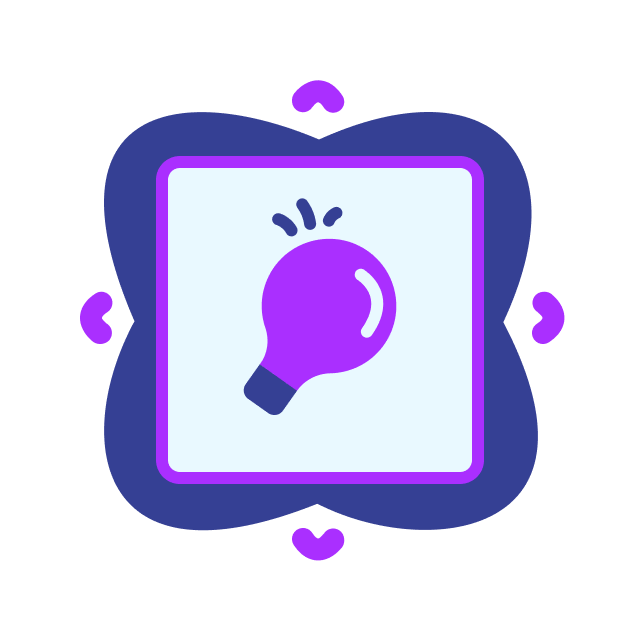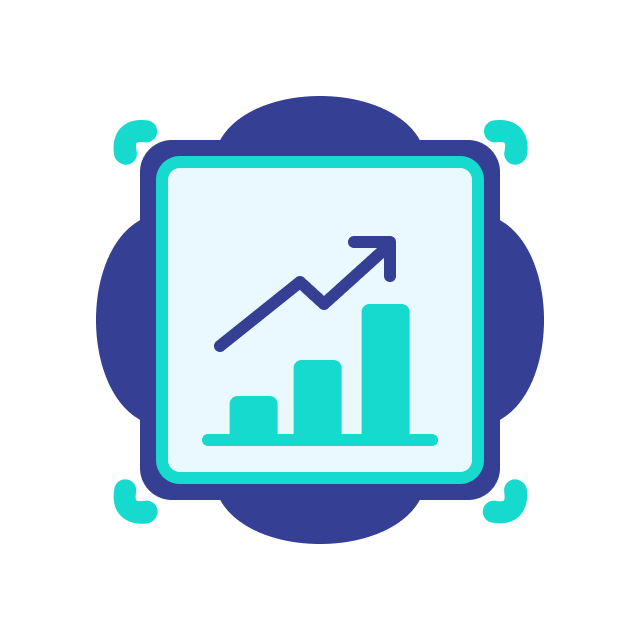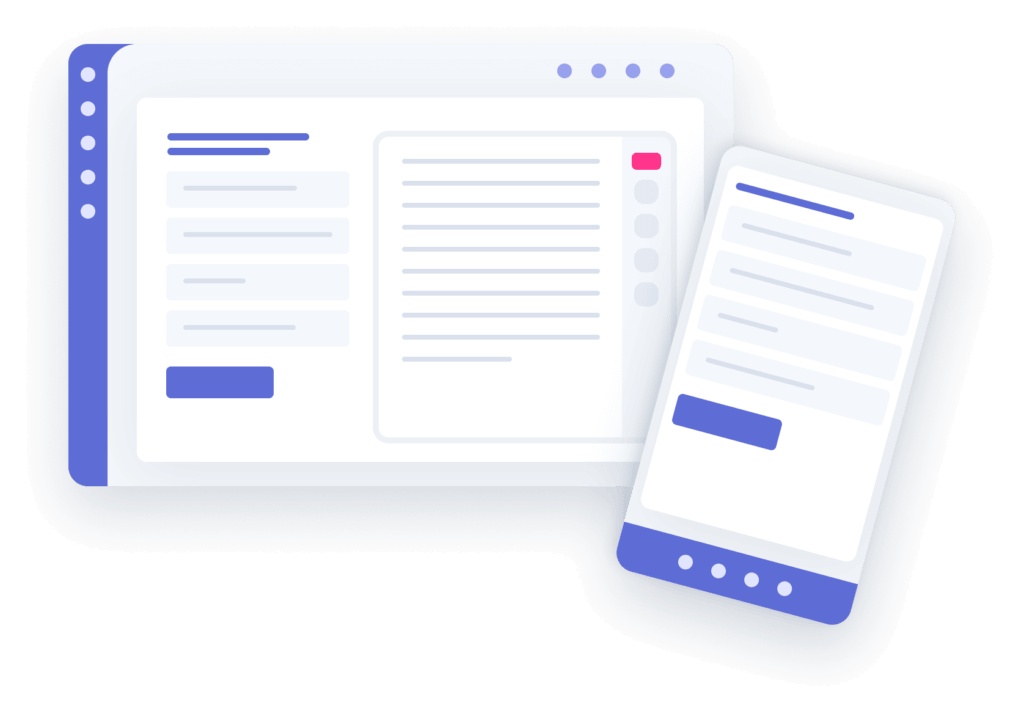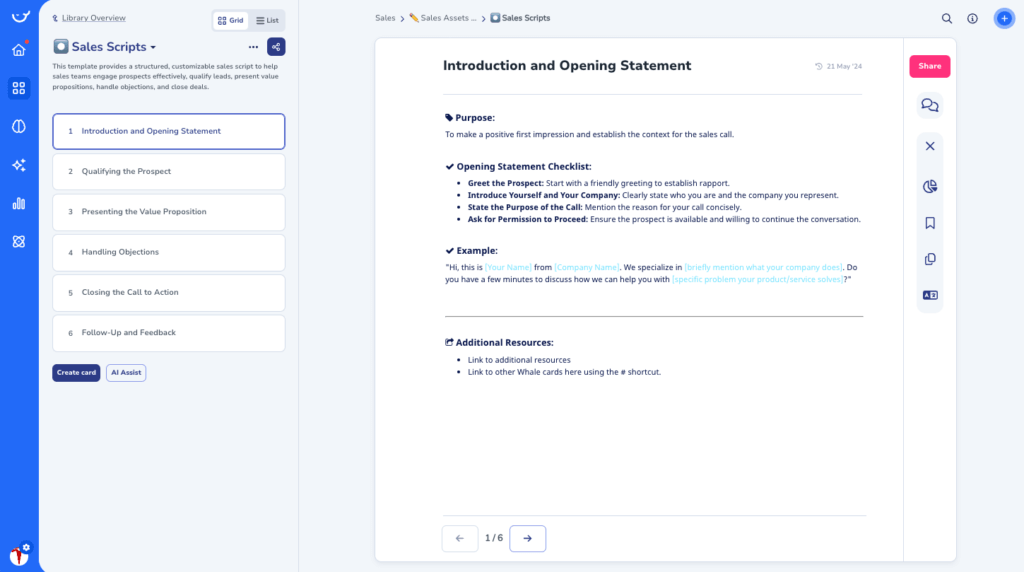
Click image for HQ version
Our ultimate sales script template will give your sales team all the information they might need in a sales call to take your sales process all the way to closing! This might be to handle frequently asked questions, objections, and rejections, or simply to share additional helpful information with customers.
Sales scripts are powerful tools that can help you unlock growth by ensuring consistent, effective communication with potential customers. By understanding their key elements, customizing them to fit your audience, and continuously refining them based on feedback, you can improve your sales performance and achieve your business goals.
What is a sales script?
A sales script is a pre-written dialogue or guide that sales professionals use to engage potential customers. It serves as a roadmap, ensuring that all key points are covered during a sales call or meeting.
The goal is to maintain consistency, stay on message, and increase the likelihood of closing a sale. A well-crafted sales script can significantly improve your team’s efficiency and effectiveness, leading to higher conversion rates.
But it’s about quality too!
80% of a company’s revenue is typically generated by 20% of its customers so you’ll want to focus your sales script on the right kind of prospects.
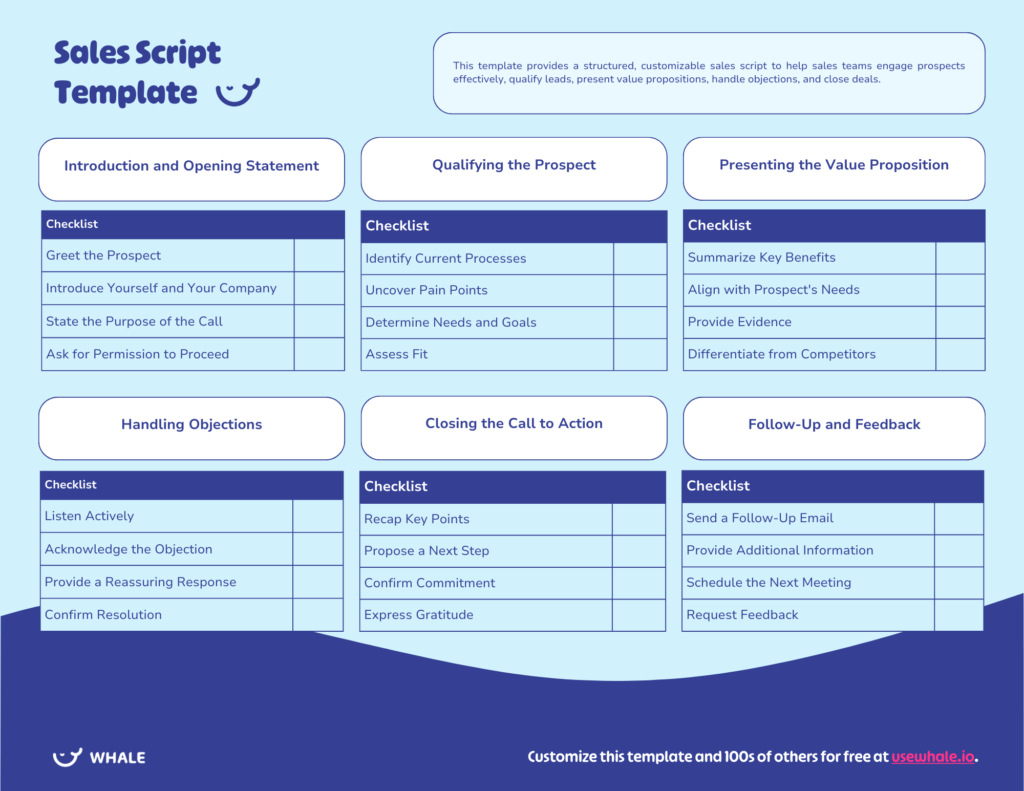
How to use a sales script template?
According to a study by Salesforce, high-performing sales teams are 2.3 times more likely to use guided selling techniques like sales scripts than underperforming teams. This highlights the importance of having a structured approach to sales conversations. Consider it part of your growth playbook.
Using a sales script template is straightforward and can be highly effective when done correctly.
Here are the steps to get started:
- Identify Your Objective: Know what you aim to achieve with the call. Are you qualifying a lead, closing a sale, or scheduling a meeting?
- Customize the Template: Tailor the script to your specific product, service, and audience. Personalization is key to making the conversation feel genuine.
- Practice: Rehearse the script until it sounds natural. Role-playing with colleagues can help identify any awkward phrasing or gaps in information.
- Be Flexible: Use the script as a guide, not a rigid framework. Be ready to adapt based on the flow of the conversation.
- Gather Feedback: After calls, review what worked and what didn’t. Adjust the script based on real-world feedback to continually improve its effectiveness.
PS Find more templates to help you in your sales process.
Marty Neumeier on The Perfect Sales Pitch
Use our templates to fast-track your documentation
Customize this template and 100s of others for free in Whale, the fastest way to get your team aligned.
How to do client research for a sales script?
Before having a discussion with a client or potential customer it’s important to understand their scenario and situation.
Use search engines and LinkedIn profiles during pre-call sales planning to help discover the contact’s company, role, and other relevant details.
Here is the information you should know before connecting with a client or customer on a call;
- Name
- Title
- Organization
- History of the organization
- Where are they in their buying cycle?
- How did they find you?
- Specific points of interest that you could highlight to them? E.g. You might highlight to an insurance client that your solution has helped 10 other insurance companie
- What is their pain? I.e. What problem are they trying to solve?
Key elements of a sales script
Creating an effective sales script involves several key elements:
1. Opening Statement
Your opening should grab the prospect’s attention and set the tone for the call. Introduce yourself, your company, and the purpose of the call.
Example: “Hi, this is John from ABC Solutions. We specialize in helping businesses like yours streamline operations and boost productivity. Do you have a few minutes to discuss how we can help you?”
2. Qualifying Questions
Ask questions to understand the prospect’s needs and determine if they are a good fit for your product or service.
Example: “Can you tell me about your current process for managing inventory? What challenges are you facing in this area?”
3. Value Proposition
Clearly articulate how your product or service can solve the prospect’s problems or improve their situation.
Example: “Our software can reduce your inventory management time by 50%, allowing you to focus on growing your business.”
4. Handling Objections
Be prepared to address common sales objections with confident, reassuring responses.
Example: “I understand that budget is a concern. Many of our clients have found that the cost savings from increased efficiency more than cover the investment in our solution.”
5. Call to Action
End with a clear and compelling call to action. This could be scheduling a follow-up meeting, sending more information, or closing the sale.
Example: “Would you be available for a demo next Tuesday at 2 PM? I can show you exactly how our solution works and answer any questions you have.”
7 tips for sales scripts

So you get a bunch of leads and then they convert right? Um no. Reply.io estimates that as many as 90-95% of inbound leads don’t end up converting.
So when connecting with a potential lead, it’s essential to really connect! Here’s how to do it;
- Focus On Building Relationships! No one wants to be sold to, so focus on building the relationship.
- Demonstrate that you know who you’re talking to by using relevant information related to their company or industry. This means you really need to know who you’re talking to!
- Don’t Overwhelm Your Audience with Features.
Listen to their challenge and solve their challenge. - Link your benefits to pain points
- Ask questions about those pain points
- Cut Jargon From Your Script – you can’t be sure your audience will understand what you mean so speak in plain easy to understand English.
- Always close for something. It’s ok to ask for something at the end of a call. Closing means a next step.
FAQs on sales scripts
How long should a sales script be?
It’s not so much about length as it is about engagement!
A sales script should be concise enough to keep the prospect engaged but comprehensive enough to cover all critical points. Aim for a length that allows for a 5-10 minute conversation.
How can I improve my sales script?
You should keep improving your sales script over time by observing what works, and what doesn’t.
If you ask a question and your lead turns cold, you know that your script needs amending.
The same goes for the opposite. When you create a winning script that results in better sales, you’ll want to apply it more often.
How can a template improve my sales efficiency?
A sales template helps by creating an efficient proven way of approach sales and new business development.
This is especially relevant in the B2B space which has a longer sales cycle.
The more the process is refined over time, the more likely your team is likely to close sales.
What other sales templates do I need?
To really ace your sales process we recommend using these essential sales processes;
Can sales scripts work for all industries?
Yes, sales scripts can be adapted for any industry. The key is to tailor the script to the specific needs and language of your target audience.
What if a prospect goes off-script?
Don’t panic! Remember this is a conversation.
Be flexible and listen actively. Use the script as a guide, but don’t be afraid to deviate when the conversation takes an unexpected turn. Your goal is to build a connection and address the prospect’s needs.
Use our templates to fast-track your documentation
Customize this template and 100s of others for free in Whale, the fastest way to get your team aligned.




